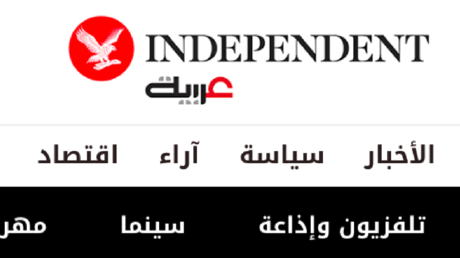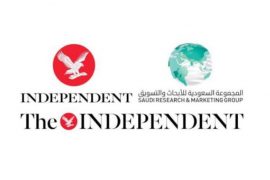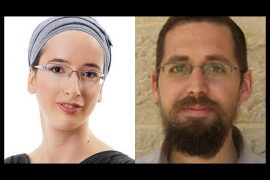Independent Arabia’s Gaza Strip correspondent ‘Izz ad-Deen Abu-‘Eisheh continues his series of interviews with Palestinian “experts” who level absurd claims about Israeli, Jewish and Zionist affairs – allegations that aren’t challenged by Indy Arabia journalists.
Here are two recent examples:
- Archivist and Hamas official ‘Abd al-Lateef Abu-Hashem argued: that “all of the ancient documents, which describe the cities of Palestine prior to the Jews’ arrival, are in Arabic, which means that the land is Arab”,
- Jurist Yaser Dirawi claimed that every resident of the Gaza envelope communities, inside internationally-recognized Israel, “sits on a land contrary to UN laws […] which described colonization as ‘illegal and violating international laws’, and affirmed that ‘residing in the settlements is considered a violation of norms, which [in turn] is a crime punishable by law’”,
The latest victim of Abu-‘Eisheh and his interviewees’ historical lies is the Hebrew language, which (in an unrelated manner, apparently) recently celebrated its annual holiday. Below are excerpts from the correspondent’s December 20th article (all translations and in-bracket remarks are by CAMERA Arabic):
“BETWEEN HEBREW AND ARABIC – ROOTS AND SIMILARITIES, BUT…
“Both originate from Aramaic, which Christ – Peace Be Upon Him [an Islamic phrase that follows the name of those whom believers consider to be prophets, including Jesus] – spoke
“About 150 years ago, the leadership of the Zionist movement decided to assemble the world’s Jews in their own nation-state, and the first step they took at the time was the creation of a language for them to speak. It was then when they began to revive Hebrew as a tongue that would unify the Jews, in preparation of their state’s establishment.
“In order to revive this language, they resorted to Aramaic, the same [language] from which Arabic had descended. History experts say that Aramaic is the language of Jesus Christ Peace Be Upon Him, that it is the language of the Arab region, and that this may be the cause of resemblance between the two.
[…]
“The Arabic and Hebrew expert Ahmad Rafiq ‘Awad says that the two languages have the same geographic root and linguistic origin […]
“Just as there are two components to the Arabic language, the standard language and the colloquial one, the Hebrew language also consists of two types. First is the original Hebrew language that the Jews see as holy; ‘Awad explains that they believe that this ancient language is the language of the Lord, so it must not be exploited or used in everyday life.
“The other type of Hebrew language is newly born. ‘Awad points out that its age doesn’t exceed 150 years, that it was conceived by a decision on behalf of the Zionist movement and that it is made up of a mixture between the Arabic language and languages that are widespread in Europe.
“History experts have confirmed to ‘Independent Arabia’ that the Hebrew language widespread today among the Jews is not the same ancient Hebrew used in their own houses of worship – which they are prohibited from using in everyday life. According to ‘Awad, every piece of paper that has ancient Hebrew imprinted on it becomes sacred.
“[…] Observers argue that the most senior Jews have decided to manufacture a language that would be close to Arabic so they could penetrate the Arabs, intending to establish their state in the middle of the Arab region. […] ‘Awad denies this, as he reasons that the Jews regard themselves a class distinct from Arabs, whereas the invention of language only came to aggregate them under one tongue, and to stand out of the Arab region while asserting that they carry progress, modernity and superior spiritual values. Therefore, they wouldn’t manufacture a language that [purports] resemblance with Arabs.
“In any case, Hebrew and Arabic are indeed very close. From the perspective of pronunciation, the wordמערה [English: cave, Hebrew pronunciation: Me-’a-RA] is pronounced in Hebrew Kahf [sic; Arabic spelling: كهف] and in Arabic Kahf, and the same is true with the wordמונה [English: “was appointed”, Hebrew pronunciation: Moo-NA] is pronounced in Hebrew ‘Ayn [sic; Arabic spelling: عين] and in Arabic ‘Ayn.”
[…]
“Due to this proximity, language experts and historians view Arabic as the broader, more comprehensive and larger [of the two], while the Hebrew language is a small branch adapted from Arabic, as Hebrew was fabricated out of Arabic for specific purposes.
Israeli Jews are fluent in Arabic
“When observing Israeli society, one generally notices that the majority of Jews are fluent in Arabic. They aspire to learn its grammar and how to converse in it, be it standard or colloquial. On most occasions, they succeed in mastering it because of the proximity between the two languages.
“’Awad reckons that the Jews learn Arabic so they would be able to understand the Palestinian people’s way of thinking, and also because of the rich culture that is found among Arabs”
[…]
“It is observed that Jews are divided in two halves, the first refrains from using Arabic terms in its everyday life or in political discourse; Awad indicates that those [who belong to this half] belong to the Ashkenazi sect, which harbors a view of supremacy and pride towards Hebrew.
“As for the Israeli leadership’s use of several Arabic terms, ‘Awad explains this with the prevalence of the Eastern [i.e. Mizrahi/Sepharadi] sects whose language was originally Arabic […].”
To a media criticism blog like UK Media Watch, such a steady flow of errors, fallacies, half-truths and misconceptions, published under the auspices of a seemingly reputable Western news site, presents a dilemma. Is it even worth unpacking an article quoting a group of unnamed “language experts and historians”, who seriously suggest the following:
“Arabic is the broader, more comprehensive and larger [of the two], while […] Hebrew was fabricated out of Arabic for specific purposes”,
Eventually we (UKMW, jointly with CAMERA Arabic) decided in favor of dividing this post in two parts.
This first one aims at exposing, yet again, what content The Independent allows to be published in its name, as long, of course, as it’s in a language inaccessible to most of its readers. Therefore this part consists mainly of the English translation of the article, while briefly addressing a few of the clearest errors: namely those who are not related directly to the article’s underlying narrative of Jewish history:
“Hebrew, Arabic and Aramaic”
Hebrew, Arabic and Aramaic are three separate branches of the same Semitic language family, and have been considered as such by the vast majority of researchers since the dawn of linguistic genealogy.
Despite mutual influences that are common in the case of related languages which have been in close proximity throughout both ancient and modern history, neither of them are a descendant of the other. Contrary to what the article indicates with claims like “History experts say […] this [the common relation to Aramaic that both Hebrew and Arabic have] may be the cause of resemblance between the two”, the reason why Hebrew and Arabic are similar is quite clear.
Aramaic can be considered “the language of the Arab region” only if an inaccurate, anachronistic sense of the term “Arab region” is used. The main region where Aramaic was widely spoken in antiquity – the Levant and Mesopotamia, or Fertile Crescent – only became known as “Arab” after its Islamic conquest in the 7th century, and more so, following the slow transition of the local population towards speaking Arabic at the expense of Aramaic (and other) dialects. Having said that, it should be noted that Arabs, speaking Arabic and/or Aramaic, did live in the periphery of the Fertile Crescent for centuries before the emergence of Islam.
“False pronunciation instructions”
The awkward (and, obviously, false) pronunciation instructions of the two Hebrew words in the translation’s 9th paragraph are a result of Abu-‘Eisheh’s lack of basic linguistic knowledge, essential for a journalist aspiring to write a piece about the relations between any two languages. מערה and מונה are simply the Hebrew outputs of Arabic-Hebrew Google Translate webpage once the Arabicكهف and عين inputs are typed inside its command prompt, respectively.
However, mere translations of Arabic words into Hebrew is not what the reporter was after; he was looking for pairs of Arabic and Hebrew cognates, words with the same etymological origin that, in this specific case, would also be each other’s translations and would have similar, if not identical, pronunciation. Just to be clear, neither Arabic word that Google Translate’s algorithm detected (Kahf, Arabic for “cave”; ‘UY-yi-na, Arabic for “was appointed”) even have such a Hebrew cognate.
Interestingly, מערה (Me-‘a-RA, Hebrew for “cave”) does have an Arabic translation that is also its cognate, which isكهف (Kahf)’s synonym, مغارة (Ma-GHA-ra). The same is true for the homograph, a different word spelled identically, ofعين (‘UY-yi-na), which is عين (‘Ayn, Arabic for “eye”).عين (‘Ayn) does have a Hebrew translation that is also its cognate –עין (‘A-yin, Hebrew for “eye”). Abu ‘Eisheh probably already knew that there are Hebrew and Arabic words for “cave” and “eye” which resemble each other; however, he disregarded the existence of synonyms (in the case of מערה كهف/مغارة) and homographs (in the case of عين מונה/עין), which led him to think that the Arabic-Hebrew Google Translate webpage would automatically provide him pairs of cognates. Embarrassingly, this was not the case.
“Israeli Jews’ fluency in Arabic
According to a 2015 first of its kind study conducted by the Van Leer Institute in Jerusalem, unfortunately only a small margin of Israeli Jews – less than 10% – claim to have a good understanding of Arabic, and less than 3% are capable of advanced skills such as reading an Arabic newspaper or writing an Arabic email. This contradicts the Indy Arabia journalist’s claim that “the majority of Jews are fluent in Arabic”.
“Inquiries are welcome”
The second part of this post, meanwhile, will take the form of an op-ed as it will attempt to confront broader premises that are evident throughout the article – a whole array of prejudices against Judaism, Zionism and Israel, as well as a highly problematic perception of the very concepts of journalism and scholarship and their role in Arab societies.
Regrettably, both traits are characteristic not only to Abu ‘Eisheh’s article but also to an entire genre of such texts, published regularly in Arabic-speaking media outlets (including those who operate under Western brand names like Independent Arabia). Therefore, we believe that an analysis that uses this article as an instrument to provide insights about the genre would be instructive; additionally, we invite our readers to comment on the first part so we can focus on selected issues that you find important once we publish the second one.
(Independent Arabia is a joint venture between the UK based Independent and the Saudi media group SRMG)
Related Posts:
- AP falsely alleges Lebanese-American Amer Fakhoury “worked for Israel” (CAMERA)
- BBC News again recycles Syrian propaganda (BBC Watch)
- The Times corrects description of convicted terrorists as ‘alleged militant’ (UK Media Watch)





